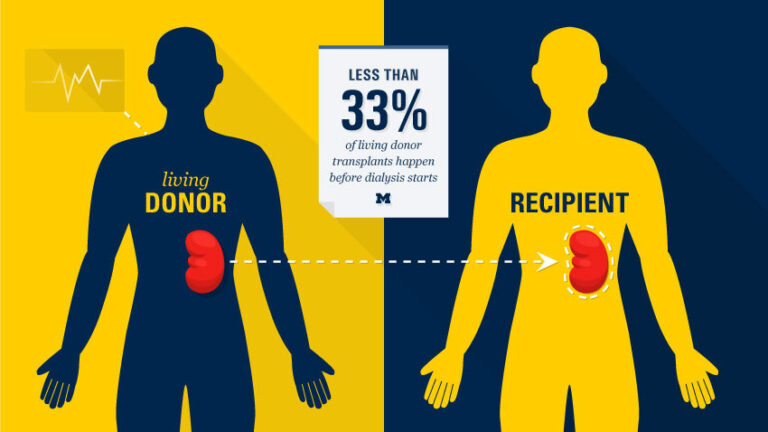What is a kidney transplant?

People whose kidneys have failed usually undergo a treatment called dialysis. This treatment mechanically filters waste that builds up in the bloodstream when the kidneys stop working.
Some people whose kidneys have failed may qualify for a kidney transplant. In this procedure, one or both kidneys are replaced with donor kidneys from a live or deceased person.
There are pros and cons to both dialysis and kidney transplants.
Undergoing dialysis takes time and is labor-intensive. Dialysis often requires making frequent trips to a dialysis center to receive treatment. At the dialysis center, your blood is cleansed using a dialysis machine.
If you’re a candidate to have dialysis in your home, you’ll need to purchase dialysis supplies and learn how to use them.
A kidney transplant can free you from a long-term dependence on a dialysis machine and the strict schedule that goes with it. This can allow you to live a more active life. However, kidney transplants aren’t suitable for everyone. This includes people with active infections and those who are severely overweight.
During a kidney transplant, your surgeon will take a donated kidney and place it in your body. Even though you’re born with two kidneys, you can lead a healthy life with only one functioning kidney. After the transplant, you’ll have to take immune-suppressing medications to keep your immune system from attacking the new organ.
A kidney transplant may be an option if your kidneys have stopped working entirely. This condition is called end-stage renal disease (ESRD) or end-stage kidney disease (ESKD). If you reach this point, your doctor is likely to recommend dialysis.
In addition to putting you on dialysis, your doctor will tell you if they think you’re a good candidate for a kidney transplant.
You’ll need to be healthy enough to have major surgery and tolerate a strict, lifelong medication regimen after surgery to be a good candidate for a transplant. You must also be willing and able to follow all instructions from your doctor and take your medications regularly.
If you have a serious underlying medical condition, a kidney transplant might be dangerous or unlikely to be successful. These serious conditions include:
- cancer, or a recent history of cancer
- serious infection, such as tuberculosis, bone infections, or hepatitis
- severe cardiovascular disease
- liver disease
Your doctor may also recommend that you don’t have a transplant if you:
- smoke
- drink alcohol in excess
- use illicit drugs
If your doctor thinks you’re a good candidate for a transplant and you’re interested in the procedure, you’ll need to be evaluated at a transplant center.
This evaluation usually involves several visits to assess your physical, psychological, and familial condition. The center’s doctors will run tests on your blood and urine. They’ll also give you a complete physical exam to ensure you’re healthy enough for surgery.
A psychologist and a social worker will also meet with you to make sure you’re able to understand and follow a complicated treatment regimen. The social worker will make sure you can afford the procedure and that you have adequate support after you’re released from the hospital.
If you’re approved for a transplant, either a family member can donate a kidney or you’ll be placed on a waiting list with the Organ Procurement and Transplantation Network (OPTN). The typical wait for a deceased donor organ is over five years.
